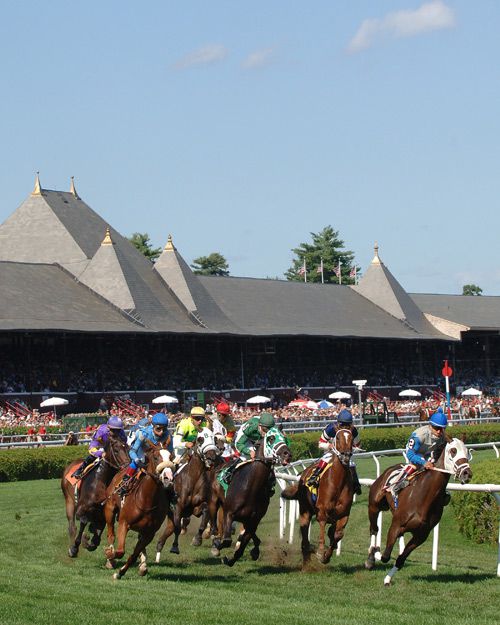With Tom Durkin announcing he is retiring after Saratoga, the outpouring of saddness and affection has been overwhelming. There was a time when the argument over who was the best race caller pitted Trevor Denman against Tom Durkin. For quite a while now the argument has been settled in Durkin’s favor.
Durkin admitted he was not sentimental about his craft. When asked what his job was, he said it was simply to describe what was happening during a race. That so understates what the race caller does. He paints a picture that even a blind man could see. At their best, they are poetic. They are excited when the crowd is excited, and if they are not pumped up, the race caller gets them involved. They are funny when the time is right. They tell us the somber news when a horse breaks down, and they do it in a professional way. They amplify a magnificent performance, letting the crowd know that they are witnessing something special. Their calls of great races stay in our memory. Fred Caposella calling Jaipur and Ridan in the 1962 Travers. Durkin calling Flanders and Serena’s Song in the 1994 Breeder’s Cup. Chick Anderson calling the great Secretariat the 1973 Belmont. The list goes on and on.
The best race callers define racegoing for a generation. When Fred Caposella retired, people in my father’s generation lamented they would never see another like him. Much the same has been the reaction to Durkin leaving.
The great race callers add to the lexicon of racing. “And down the stretch they come” from Dave Johnson. “Moving like a winner” from Trevor Denman. “Here they come spinning out of the turn” from Durkin’s model, Phil Georgeff.
I have to tell this story that involved Marshall Cassidy, the NYRA race caller Durkin succeeded. If you ever heard Cassidy call a race, he had the diction of a Shakespearean actor, but never varied he tone much during a race. We never questioned his accuracy, but he wasn’t known for his blood pumping calls. On an otherwise non-memorable weekday, a bunch of regulars were milling around the OTB in Amsterdam. As I remember, at that time all we got was an audio of the race call on delay. Cassidy is doing his normal straightforward call, when a horse named What a Wabbit takes the lead. When Cassidy comes out with, What a Wabbit on the wail, the entire place cracked up. None of us could ever remember Cassidy even being remotely humorous.
Durkin turned the start of a race into his signature, “Annnnd, they’re off.” He knew precisely when it was safe to be funny. Everybody recognizes his calls of Arggghhhh or Doremifasollatido. In his impossible call of Yakahickamickadola he was really making fun of his own inability to get the name out of his mouth correctly. Everyone laughed and no one took it the wrong way. He paid tribute to the great Keith Jackson in his call of Whoa Nellie. Ready’s Echo coming from “another county” to finish second in a maiden race. He expressed the frustration of everyone watching a race in the fog at Aqueduct when he said, “wish I could see it.” He even knew when not say anything as he did when Commentator won a race by a city block.
Tom Durkin was not just good at his job. He was as good as anyone who has ever done that job.
Larry Collmus said it best when he noted he was not replacing Durkin, merely succeeding him.

I’ll add Harry Henson to the mix; Durkin and Denman in their primes were great, but I’m always partial to Dave Johnson as the best/most accurate race caller in my generation.
I was always a big Dave Johnson fan. It’s unfortunate his personal issues messed up his career. Harry Henson, like Capposella in NY, was legend in the West. Excellent choices.